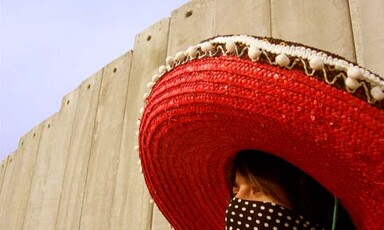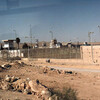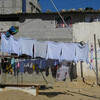
Film Review: "Bethlehem Bandolero"
18 May 2006
Bethlehem Bandolero is a quirky six-minute short by Palestinian filmmaker Larissa Sansour. In the role of a “Mexican gunslinger” that could be straight out of a Spaghetti Western, Sansour’s performance captures the irrationality of Israel’s building of a twenty-five foot “security” wall as means of seeking “peace” with Palestinians. Sansour confronts the illogic of the situation with her own demonstration of absurdity in a witty but bizarre journey in her native Palestine where she takes on the wall in a High Noon-like duel, dressed in a pistol-toting getup that includes a large red sombrero and a black and white polka-dot bandana that covers her face. Read more about Film Review: "Bethlehem Bandolero"








